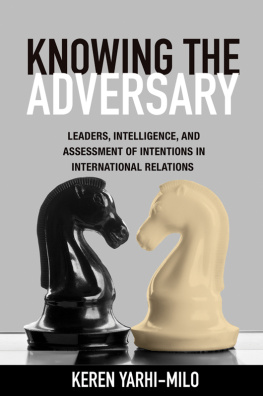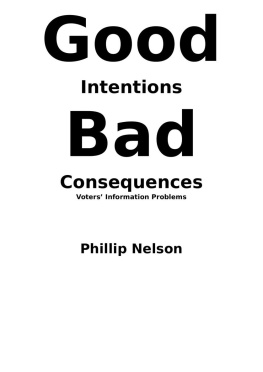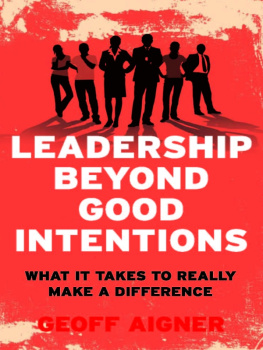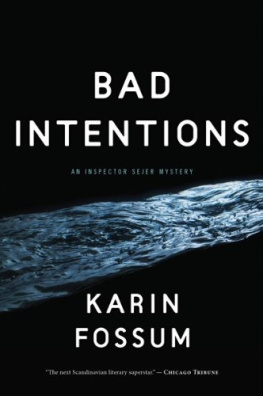KNOWING THE ADVERSARY
PRINCETON STUDIES IN INTERNATIONAL HISTORY AND POLITICS
Series Editors
G. John Ikenberry and Marc Trachtenberg
RECENT TITLES
Knowing the Adversary: Leaders, Intelligence, and Assessment of Intentions in International Relations by Keren Yarhi-Milo
Nuclear Strategy in the Modern Era: Regional Powers and International Conflict by Vipin Narang
The Cold War and After: History, Theory, and the Logic of International Politics by Marc Trachtenberg
Liberal Leviathan: The Origins, Crisis, and Transformation of the American World Order by G. John Ikenberry
Worse Than a Monolith: Alliance Politics and Problems of Coercive Diplomacy in Asia by Thomas J. Christensen
Politics and Strategy: Partisan Ambition and American Statecraft by Peter Trubowitz
The Clash of Ideas in World Politics: Transnational Networks, States, and Regime Change, 15102010 by John M. Owen IV
How Enemies Become Friends: The Sources of Stable Peace by Charles A. Kupchan
1989: The Struggle to Create PostCold War Europe by Mary Elise Sarotte
The Struggle for Power in Early Modern Europe: Religious Conflict, Dynastic Empires, and International Change by Daniel H. Nexon
Strong Borders, Secure Nation: Cooperation and Conflict in Chinas Territorial Disputes by M. Taylor Fravel
The Sino-Soviet Split: Cold War in the Communist World by Lorenz M. Lthi
Nuclear Logics: Contrasting Paths in East Asia and the Middle East by Etel Solingen
Social States: China in International Institutions, 19802000 by Alastair Iain Johnston
Appeasing Bankers: Financial Caution on the Road to War by Jonathan Kirshner
The Politics of Secularism in International Relations by Elizabeth Shakman Hurd
Unanswered Threats: Political Constraints on the Balance of Power by Randall L. Schweller
Producing Security: Multinational Corporations, Globalization, and the Changing Calculus of Conflict by Stephen G. Brooks
Driving the Soviets up the Wall: Soviet-East German Relations, 19531961 by Hope M. Harrison
KNOWING THE ADVERSARY
LEADERS, INTELLIGENCE, AND ASSESSMENT OF INTENTIONS IN INTERNATIONAL RELATIONS
Keren Yarhi-Milo
PRINCETON UNIVERSITY PRESS
PRINCETON AND OXFORD
Copyright 2014 by Princeton University Press
Published by Princeton University Press, 41 William Street, Princeton, New Jersey 08540
In the United Kingdom: Princeton University Press, 6 Oxford Street, Woodstock, Oxfordshire OX20 1TW
press.princeton.edu
Jacket art Dima Sobko/Shutterstock.
All Rights Reserved
Library of Congress Cataloging-in-Publication Data
Yarhi-Milo, Keren, 1978
Knowing the adversary : leaders, intelligence, and assessment of intentions in international relations / Keren Yarhi-Milo.
pages cm (Princeton studies in international history and politics)
Summary: States are more likely to engage in risky and destabilizing actions such as military buildups and preemptive strikes if they believe their adversaries pose a tangible threat. Yet despite the crucial importance of this issue, we dont know enough about how states and their leaders draw inferences about their adversaries long-term intentions. Knowing the Adversary draws on a wealth of historical archival evidence to shed new light on how world leaders and intelligence organizations actually make these assessments. Keren Yarhi-Milo examines three cases: Britains assessments of Nazi Germanys intentions in the 1930s, Americas assessments of the Soviet Unions intentions during the Carter administration, and the Reagan administrations assessments of Soviet intentions near the end of the Cold War. She advances a new theoretical frameworkcalled selective attentionthat emphasizes organizational dynamics, personal diplomatic interactions, and cognitive and affective factors. Yarhi-Milo finds that decision makers dont pay as much attention to those aspects of state behavior that major theories of international politics claim they do. Instead, they tend to determine the intentions of adversaries on the basis of preexisting beliefs, theories, and personal impressions. Yarhi-Milo also shows how intelligence organizations rely on very different indicators than decision makers, focusing more on changes in the military capabilities of adversaries. Knowing the Adversary provides a clearer picture of the historical validity of existing theories, and broadens our understanding of the important role that diplomacy plays in international security. Provided by publisher.
Includes bibliographical references and index.
ISBN 978-0-691-15915-7 (hardback) ISBN 978-0-691-15916-4 (paperback) 1. Intelligence service. 2. International relations. 3. World politics20th century. 4. Great BritainForeign relations19361945. 5. Great BritainForeign relationsGermany. 6. GermanyForeign relationsGreat Britain. 7. United StatesForeign relations19451989. 8. United StatesForeign relationsSoviet Union. 9. Soviet UnionForeign relationsUnited States. 10. Detente. I. Title.
JF1525.I6Y37 2014
327.12dc23
2014000415
British Library Cataloging-in-Publication Data is available
This book has been composed in Minion Pro
Printed on acid-free paper.
Printed in the United States of America
1 3 5 7 9 10 8 6 4 2
To my mother, Dvora Yarhi, and the memory of my father, Moshe Yarhi
ACKNOWLEDGMENTS

I could not have written this book without the support and guidance of several remarkable individuals. Robert Jervis was my academic adviser when I was an undergraduate student at Columbia and my first professor of international relations. He is the reason I chose to enter graduate school and become a political scientist. His tremendous knowledge of history, rigorous mind, and enthusiasm for teaching and mentoring were so inspiring. He has been a constant source of support, and his advice has always proven to be extremely useful. It is clear, to me at least, that his intellectual impact on my thinking is evident in every page of this book. Barbara Farnham and Dick Betts encouraged me to pursue a PhD, and helped me to think critically even as an undergraduate student, and Ian Lustick challenged me from the beginning of graduate school to think untraditionally about traditional topics in political science. Daryl Presss own work provided a great motivation, and his criticism and suggestions were always invaluable. Edward Mansfieldthank you for your vote of confidence in me and keeping me on track. I cannot overstate Avery Goldsteins contribution to this project. Avery is the epitome of a great mentor. I certainly could not have gone through graduate school, let alone finish my dissertation, if it were not for his emotional support and substantive comments. He is one of a kind, and everyone who knows him seems to share this feeling. I can only wish to be as good a mentor to my students as he has been to me.













